2012 年河南许昌中考英语真题及答案
一、听力理解(20 小题,每小题 1 分,共 20 分)
第一节
听下面 5 段对话。每段对话后有一个小题,从题中所给的 A、B、C 三个选项中选出最佳
答案。每段对话读两遍。
1.What are they going to do this weekend?
A. Go camping.
B. Go fishing.
C. Go boating.
2.Who is using the eraser now?
A. Lucy.
B. Tom.
C. Bob.
3.How did the boy come to school today?
A. By bus.
B. By bike.
C. On foot.
4.Where are the two speakers talking?
A. In a park.
B. In a museum.
C. In a clothing store.
5.How often will the man take the medicine?
A. Once a day.
B. Twice a day.
C. Three times a day.
第二节
听下面几段对话或独白。每段对话或独白后有几个小题,从题中所给的 A、B、C 三个选
项中选出最佳答案。每段对话或独白读两遍。
听下面一段对话,回答第 6 至第 7 两个小题。
6.What does the woman order?
A. A beef hamburger.
B. A chicken sandwich.
C. A cheese pizza.
7.Where is the woman?
A. In a hotel.
B. In a school.
C. In a restaurant.
听下面一段对话,回答第 8 至第 9 两个小题。
8.What's the woman's favorite sport?
A. Swimming.
C. Skating.
B. Playing ping-pong.
9.What does the woman ask the man to do?
�
A. Teach her to swim.
B. Teach her to skate.
C. Teach her to play tai chi.
听下面一段独白,回答第 10 至第 12 三个小题。
10.When is the meeting going to be held?
A. At 14:30.
B. At 15:30.
C. At 16:30.
11.What does Mr Liu do?
A. A policeman.
B. A doctor.
C. A teacher.
12.What is the meeting about?
A. Study.
B. Safety.
C. Examination.
听下面一段对话,回答第 13 至第 15 三个小题。
13.Where is the boy going for vacation?
A. London.
B. Paris.
C. New York.
14.Who will the boy travel with?
A. His friends.
B. His teachers.
C. His parents.
15.How soon will the girl leave for Shanghai?
A. In a week.
B. In two weeks.
C. In a month.
第三节
听下面一篇短文。根据短文内容,找出与每个人物活动内容相符的图片。短文读两遍。
Alex
Jenny
Molly
Larry
Nick
16
17
18
19
20
二、单项选择(15 小题,每小题 1 分,共 15 分)
从 A、B、C、D 四个选项中选出一个最佳答案。
21.—Would you like
red dress as a birthday present, Mary?
—Sorry, Mom. I prefer
orange one.
A. an; an
B. a; a
C. an; a
D. a; an
22.—How was your trip in Chengdu?
—Not so good. I stayed there for two days, but it rained on
of the
days.
�
A. none
B. neither
C. both
D. all
23.Jennifer takes a lot of exercise every day and she is always full
of
.
A. knowledge
B. energy
C. change
D. courage
24.—Can you answer the door, Jim? I
the dishes.
—I'm coming, Dad.
A. do
B. did
C. have done
D. am doing
25.Yao Ming is
Chinese basketball player that ever played in the NBA.
A. tall
B. taller
C. tallest
D. the tallest
26.The Internet is so closely connected with our daily life. Can you
a
life without it?
A. understand
B. imagine
C. consider
D. expect
27.—What smells terrible, Ted?
—I'm sorry. I'll
my shoes and wash them at once.
A. take away
B. put away
C. move away D. get away
28.—I left my keys in the room yesterday. I had to get in
the window.
—It's dangerous to do that.
A. in
B. through
C. over
D. to
29.—Do you have any plans for this weekend?
—I'm not sure. I
go climbing Mount Yuntai.
A. must
B. need
C. may
D. can
30.—Have you heard of Earth Day?
—Yes. The first Earth Day
in 1970 to educate us to protect our
planet.
A. celebrates
B. celebrated
C. is celebrated
D. was celebrated
�
31.We should give the boy another chance
he has made some mistakes.
A. though
B. when
C. unless
D. because
32.—I'd like to introduce my best friend to you, Peter.
—Thank you, Lucy. But we
already.
A. meet
B. met
C. will meet D. have met
33.Success will belong to those
never say "impossible".
A. whom
B. what
C. who
D. which
34.
out your love. The world will become a nicer place to live in.
A. Speak
B. To speak
C. Spoke
D. Speaking
35.My pen pal from America is coming to visit me. I'm thinking about
.
A. what present did I give her
B. how I will give her a surprise
C. where will we have a big meal
D. whether I planned a trip for her
三、完形填空(10 小题,每小题 1 分,共 10 分)
先通读短文,掌握其大意,然后从 A、B、C、D 四个选项中选出一个可以填入相应空白处
的最佳答案。
A young man was interested in jade (玉) stones. So he went to Mr Smith, a
gemologist(玉石家), to learn from him. Mr Smith refused because he feared that
the young man would not have the
36
to learn. The young man asked for a
chance again and again.
37
Mr Smith agreed and told him, "Be here
tomorrow."
The next morning the young man came. Mr Smith put a jade stone in the
young man's hand and told him to
38
it. He then went about his work. The
young man sat quietly and waited.
The following morning, Mr Smith again
39
a jade stone in the young
man's hand and told him to hold it. On the third, fourth, and
40
day, Mr
Smith did the same thing and repeated his
41
. On the sixth day, the young
man held the jade stone,
42
he could no longer stand the silence. "When am
I going to learn something?" asked the young man.
�
"You will learn," said Mr Smith and went about his work.
Several more days went by and the young man felt very
43
. One morning
he was asked to do it once more. As soon as he held it, the young man shouted
44
looking at his hand, "This is not the same jade stone!"
"You have begun to
45
," said Mr Smith.
36.A. chance
37.A. Slowly
B. ability
C. patience
D. time
B. Silently
C. Quickly
D. Finally
38.A. cut
B. hold
C. touch
D. watch
39.A. placed
B. took
C. gave
D. sent
40.A. third
B. fourth
C. fifth
D. sixth
41.A. instructions B. suggestions
C. promises
D. decisions
42.A. and
B. but
C. or
D. so
43.A. unhappy
B. excited
C. surprised
D. pleased
44.A. at
B. on
C. without
D. by
45.A. refuse
B. follow
C. accept
D. learn
四、阅读理解(20 小题,每小题 2 分,共 40 分)
阅读下面四篇语言材料,然后按文后要求做题。
A
One day a man found a cocoon (茧) of a butterfly in the forest. He sat
there for several hours and watched the butterfly. Suddenly a small opening
appeared, and the butterfly made its great effort to force its body through
that little hole. Then it seemed to stop making any progress. It appeared as if
it had gotten as far as it could and it could go no further.
So the man decided to help the butterfly. He cut off the remaining bit of
the cocoon so that the butterfly could come out easily. But to his surprise,
the butterfly got a heavy body and very small wings when it came out of the
cocoon.
The man continued to watch the butterfly because he expected that the body
would grow smaller at any moment and the wings would become larger and be able
to fly. But neither happened! In fact, the butterfly spent the rest of its life
crawling(爬) around with a heavy body and small wings. It was never able to fly.
�
The man was in his kindness, but he did not understand the nature rules.
Before the butterfly came out of the cocoon, fluid (液) from its body must be
forced into its wings, and then it would be ready for flying. It must have a
hard struggle (拼搏) to get through the small opening to get its freedom from
the cocoon.
Sometimes struggles are exactly what we need in our life. If God allowed
us to go through our life without any difficulties, it would make us fail. We
would not be as strong as we could have been; we could never fly.
根据材料内容选择最佳答案。
46.What was the butterfly doing at the beginning of the story?
A. It was trying to make a cocoon for itself.
B. It was struggling to get out of its cocoon.
C. It was flying among the trees in the forest.
D. It was crawling around quietly on the ground.
47.The man cut off the remaining bit of the cocoon
.
A. to take the butterfly home
B. to help the butterfly come out easily
C. to kill the butterfly
D. to stop the butterfly growing bigger
48.What do you think of the man?
A. Patient but cruel.
B. Careful and wise.
C. Kind but unwise.
D. Brave and funny.
49.What does the last paragraph (段落) tell us?
A. Struggles are sometimes necessary in our life.
B. Nothing is difficult if we put our heart into it.
C. Every good deed will come back with good result.
D. The greatest happiness in the world is to help others.
50.What is the best title for the story?
A. The Love for the Cocoon
B. The Joy of Helping Each Other
C. The Lesson of the Cocoon
�
D. The Expectation for the Butterfly
B
Ask any student which subject he or she hates most. 9 out of 10 students
will answer "math". No matter which country you visit, no matter which grade
you are in, you may not learn art, geography, chemistry or Chinese, but you
always learn math. Why is this so? How come so many students hate math, and yet
cannot avoid learning it in school?
Jenny Sanders, a high school student in California, asks, "What good do we
get from learning math? We can use computers to compute numbers, and we can use
computers to store information. I think learning math at school is a waste of
time."
However, there is much more to math than just learning to add and subtract
(减) numbers. In fact, math is not so much about calculation (计算) as it is
about learning to think logically (逻辑地) and solving problems. Of course,
Jenny is right that we can use computers to do calculations, but how would we
even know how to use the computer if we can't think logically? In short,
computers are only tools when solving problems.
For example, imagine you are a cook and must serve dinner to 100 guests.
How should you divide your resources so that you can get the job done most
efficiently(高效地)? In situations like this, the ability to think logically
will get you a reasonable answer and solve your problem.
根据材料内容选择最佳答案。
51.According to the passage, which subject do students always learn in
different grades at school?
A. Chinese.
B. Math.
C. Geography.
D. Art.
52.What does Jenny Sanders think of learning math?
A. Interesting.
B. Boring.
C. Useless.
D. Difficult.
53.Which of the following is TRUE according to the passage?
A. 90% of the students hate learning math.
B. Students can learn math well with computers.
C. Math can do calculations and store information.
�
D. Math helps students learn all the other subjects well.
54.What does the underlined word "resources" mean in the passage?
A. 科目
B. 效率
C. 信息
D. 资源
55.What does the writer want to tell us?
A. Math is just about learning to add and subtract numbers.
B. Math can be good for both our body and our mind.
C. Math helps us think logically and solve problems.
D. Math can help students find a good job in the future.
Off the Beaten Cart Path
C
The best-selling travel book which includes over 200 new places of
interest, over 200 new full-color photographs, and all-new, up-to-date
maps. It includes over 1,000 of the United States most must-see
destinations (目的地).
Cover price: $30.00
Our price: $19.80
Parents
The most popular magazine for parents who want to raise smart and
loving children. It has child development guidance, advice on your child's
health and safety, and the best way to encourage your child's learning.
Cover price: $26.00
Our price: $12.60
Best Weekend Projects
The projects (方案) are chosen from 80 special ideas to create an
unusual living space. They are practical, as well as creative. They will
improve your home and yard and can be made on weekends. And the most
important of all, they are easy to follow.
Cover price: $17.95
Our price: $13.90
�
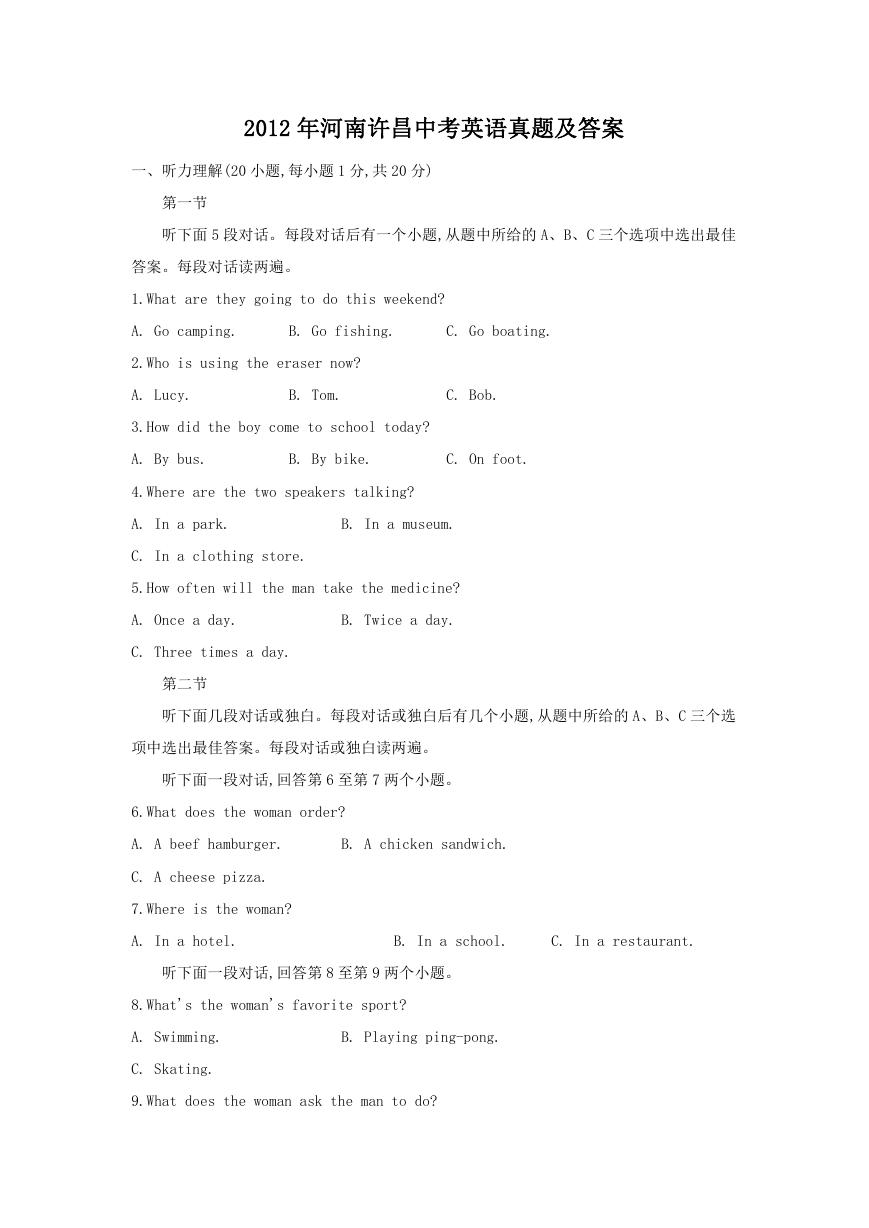
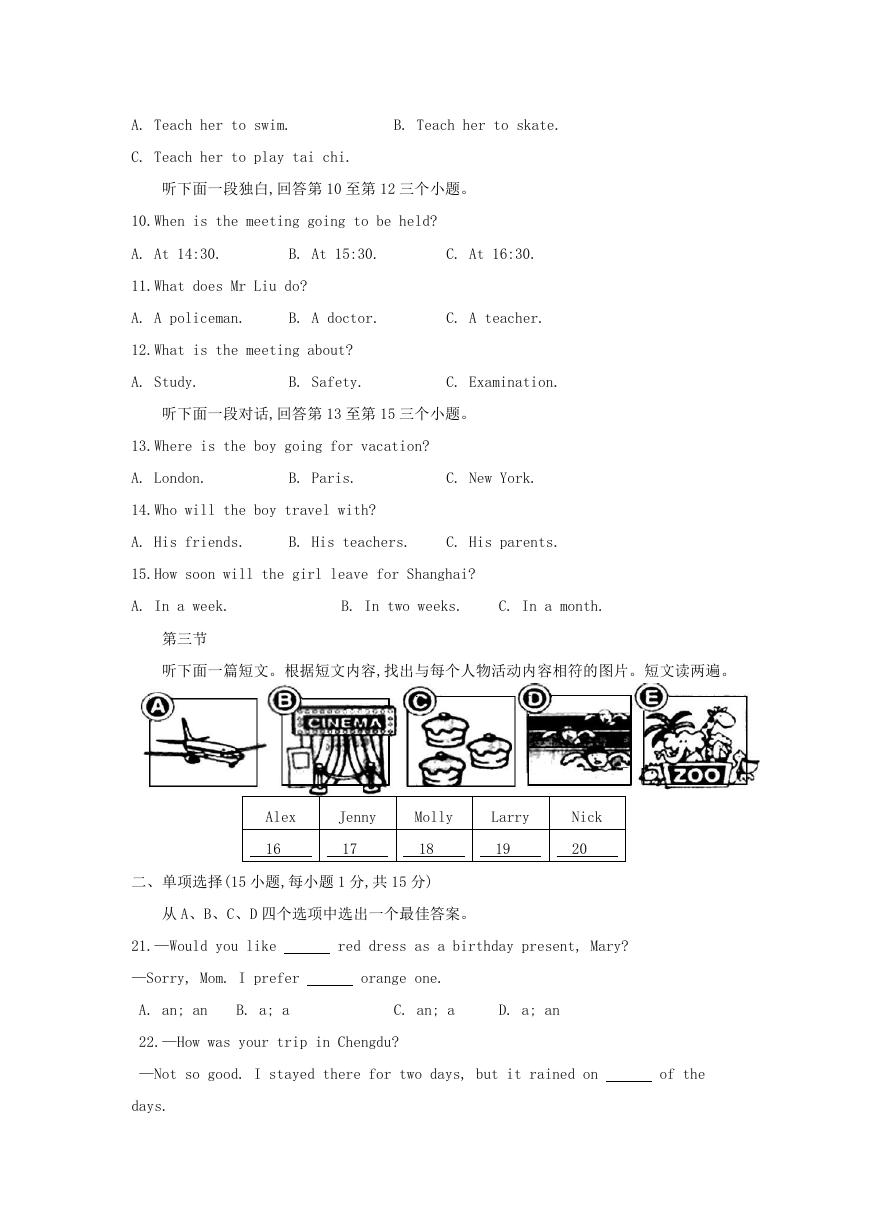
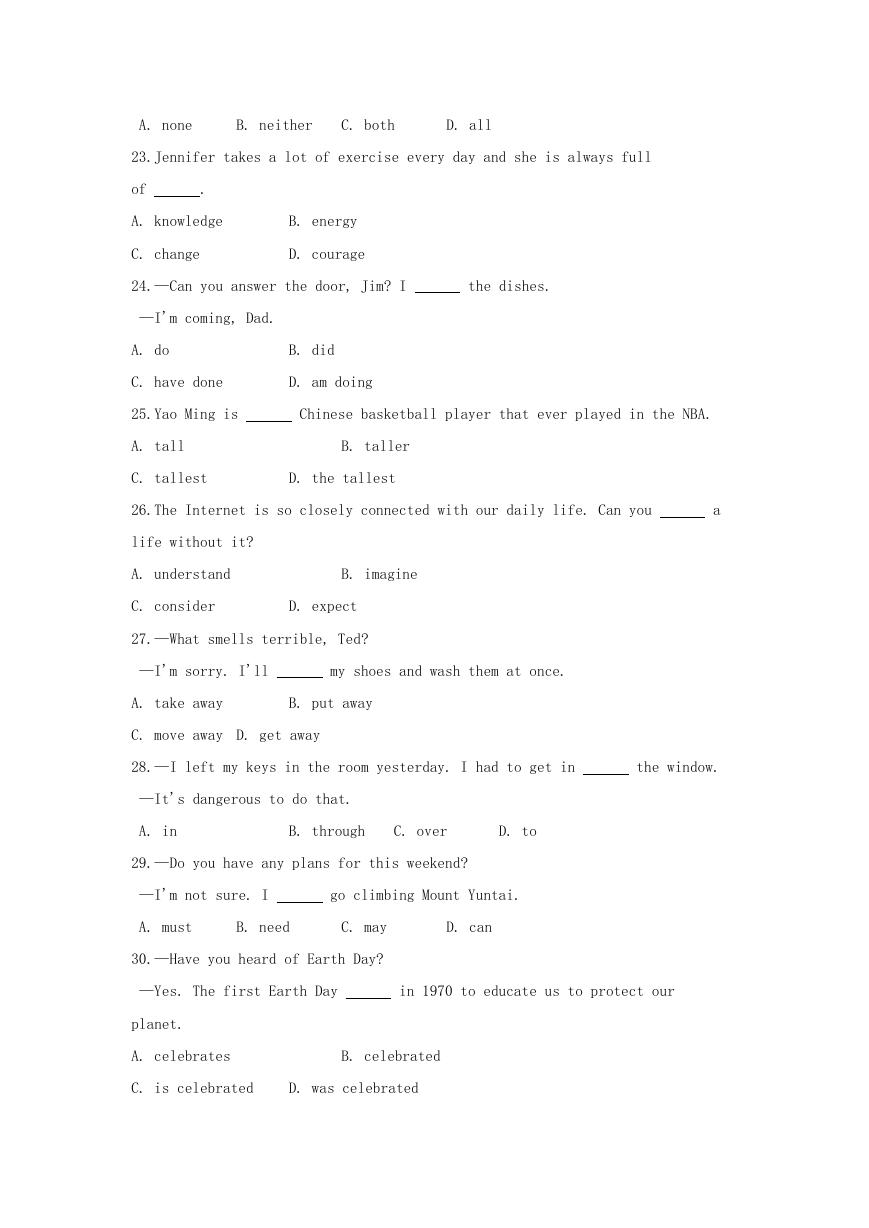
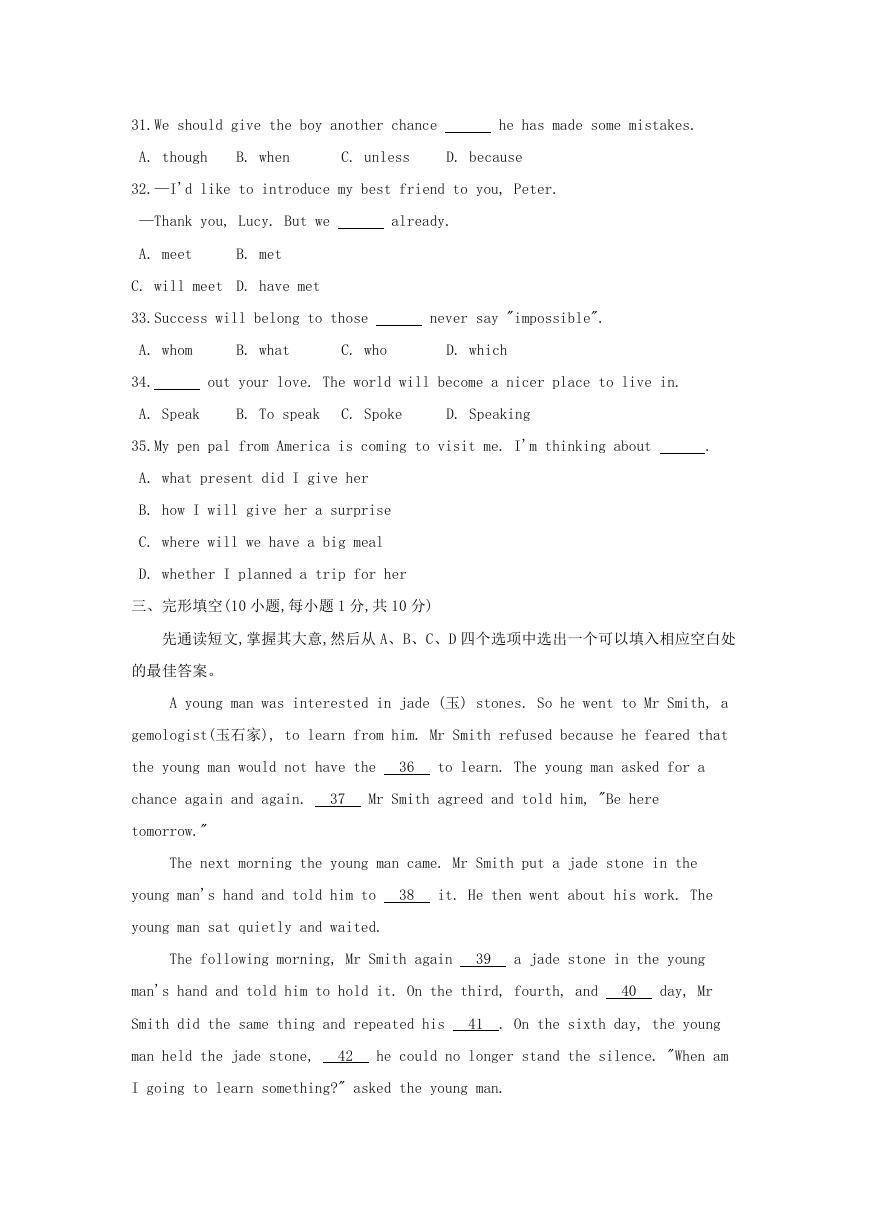
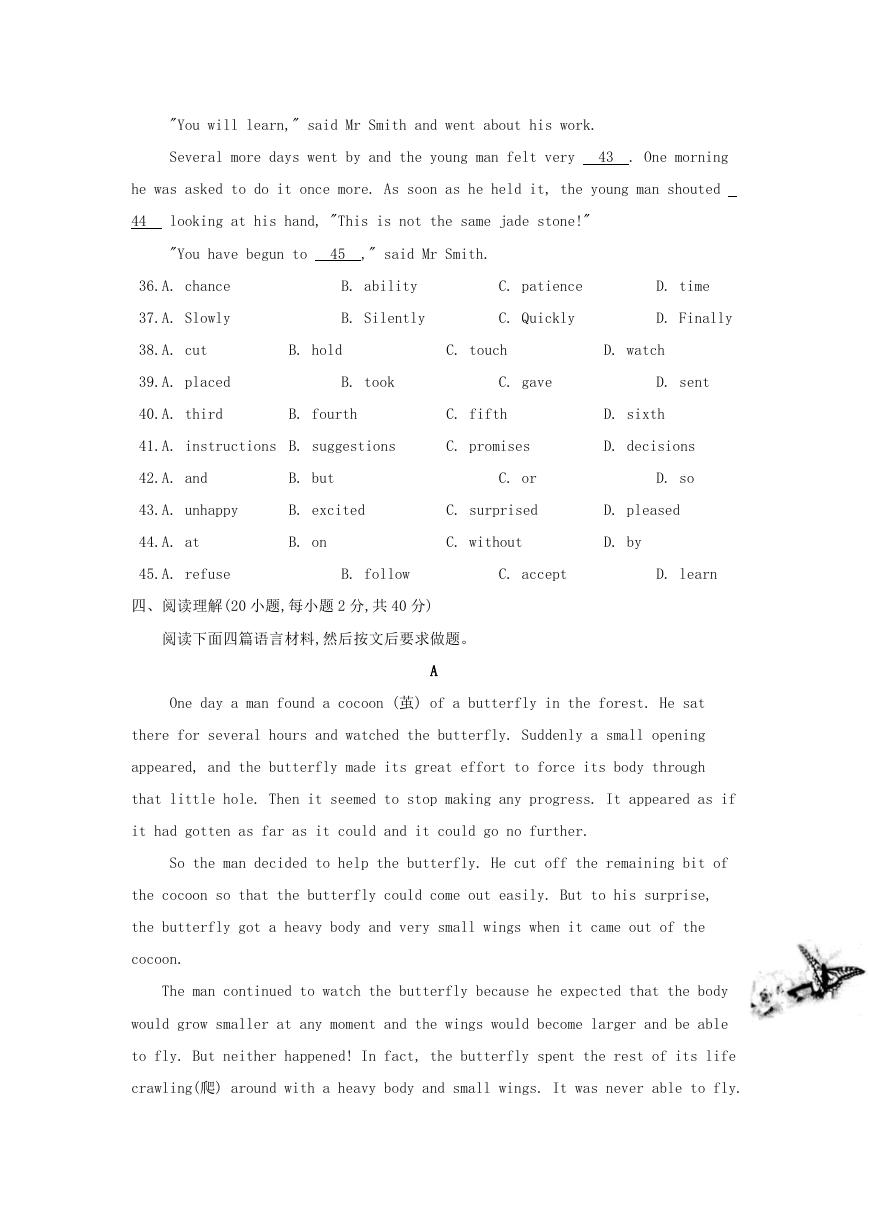
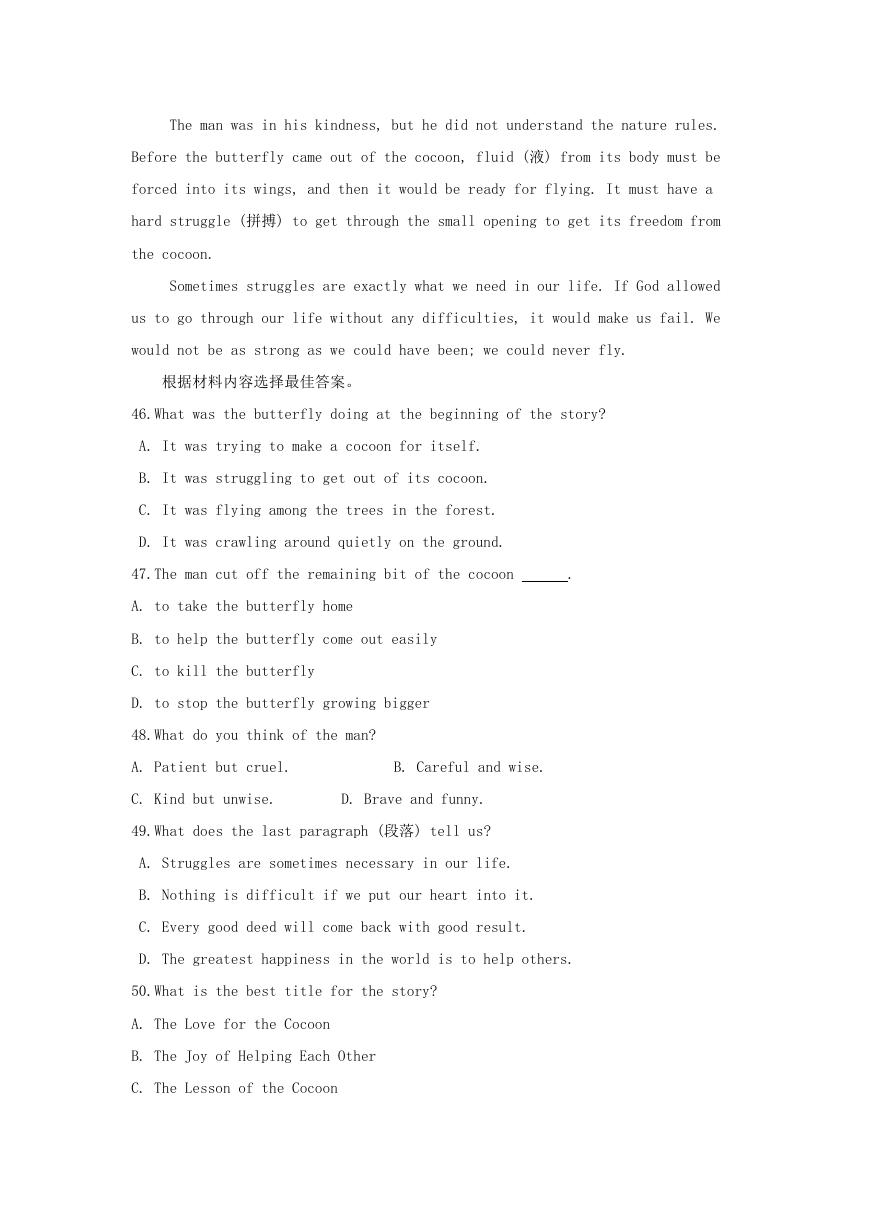
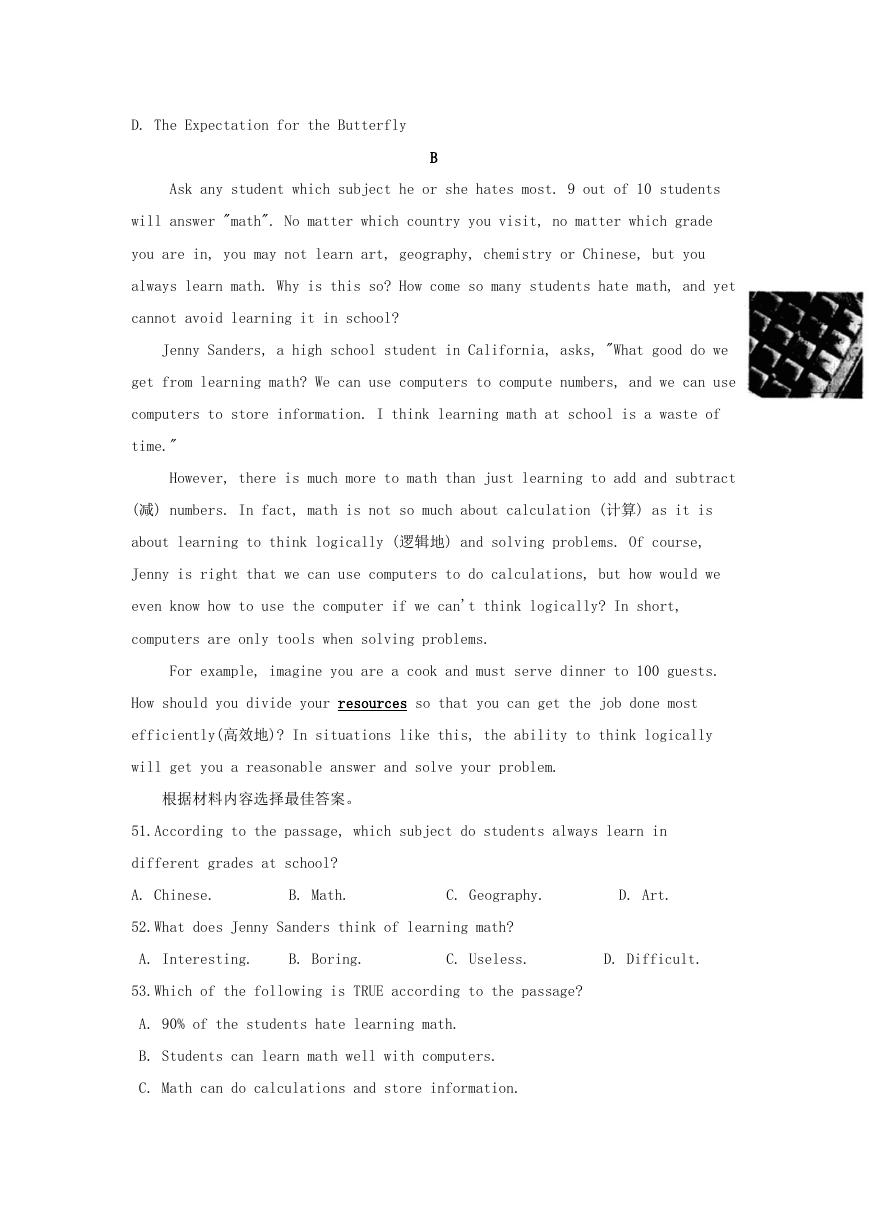
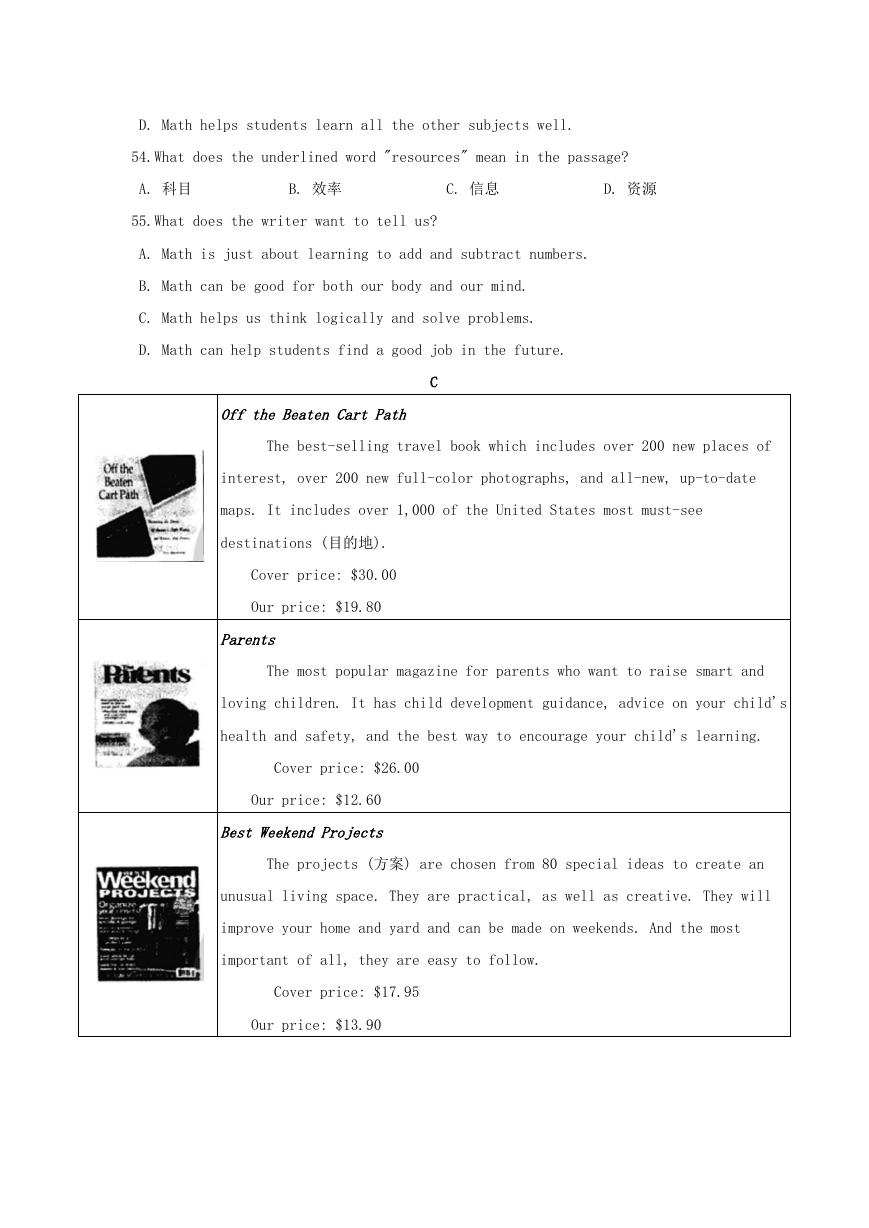








 2023年江西萍乡中考道德与法治真题及答案.doc
2023年江西萍乡中考道德与法治真题及答案.doc 2012年重庆南川中考生物真题及答案.doc
2012年重庆南川中考生物真题及答案.doc 2013年江西师范大学地理学综合及文艺理论基础考研真题.doc
2013年江西师范大学地理学综合及文艺理论基础考研真题.doc 2020年四川甘孜小升初语文真题及答案I卷.doc
2020年四川甘孜小升初语文真题及答案I卷.doc 2020年注册岩土工程师专业基础考试真题及答案.doc
2020年注册岩土工程师专业基础考试真题及答案.doc 2023-2024学年福建省厦门市九年级上学期数学月考试题及答案.doc
2023-2024学年福建省厦门市九年级上学期数学月考试题及答案.doc 2021-2022学年辽宁省沈阳市大东区九年级上学期语文期末试题及答案.doc
2021-2022学年辽宁省沈阳市大东区九年级上学期语文期末试题及答案.doc 2022-2023学年北京东城区初三第一学期物理期末试卷及答案.doc
2022-2023学年北京东城区初三第一学期物理期末试卷及答案.doc 2018上半年江西教师资格初中地理学科知识与教学能力真题及答案.doc
2018上半年江西教师资格初中地理学科知识与教学能力真题及答案.doc 2012年河北国家公务员申论考试真题及答案-省级.doc
2012年河北国家公务员申论考试真题及答案-省级.doc 2020-2021学年江苏省扬州市江都区邵樊片九年级上学期数学第一次质量检测试题及答案.doc
2020-2021学年江苏省扬州市江都区邵樊片九年级上学期数学第一次质量检测试题及答案.doc 2022下半年黑龙江教师资格证中学综合素质真题及答案.doc
2022下半年黑龙江教师资格证中学综合素质真题及答案.doc